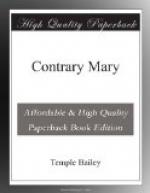Lonely, longing for a haven after the storms which had beaten him, what better could he find than this?
As for the family of Mary Ballard, what had he to do with it? His business was with Mary Ballard herself, with her frank laugh and her friendliness—and her arms full of roses!
“I like them so much that I shall consider myself most fortunate to get them.”
“Oh, really?” She hesitated and held out her hand to him. “You don’t know how you have helped me out—you don’t know how you have helped me——”
Again she saw a question in his eyes, but this time she did not answer it. She turned and went into the other room, drawing back the curtains of the deep windows of the round tower.
“I haven’t shown you the best of all,” she said. Beneath them lay the lovely city, starred with its golden lights. From east to west the shadowy dimness of the Mall, beyond the shadows, a line of river, silver under the moonlight. A clock tower or two showed yellow faces; the great public buildings were clear-cut like cardboard.
Roger drew a deep breath. “If there were nothing else,” he said, “I should take the rooms for this.”
And now from the lower hall came the clamor of voices.
“Mary! Mary!”
“I must not keep you,” he said at once.
“Mary!”
Poised for flight, she asked, “Can you find your way down alone? I’ll go by the front stairs and head them off.”
“Mary——!”
With a last flashing glance she was gone, and as he groped his way down through the darkness, it came to him as an amazing revelation that she had taken his coming as a thing to be thankful for, and it had been so many years since a door had been flung wide to welcome him.
CHAPTER II
In Which Rose-Leaves and Old Slippers Speed a Happy Pair; and in Which Sweet and Twenty Speaks a New and Modern Language, and Gives a Reason for Renting a Gentleman’s Library.
In spite of the fact that Mary Ballard had seemed to Roger Poole like a white-winged angel, she was not looked upon by the family as a beauty. It was Constance who was the “pretty one,” and tonight as she stood in her bridal robes, gazing up at her sister who was descending the stairs, she was more than pretty. Her tender face was illumined by an inner radiance. She was two years older than Mary, but more slender, and her coloring was more strongly emphasized. Her eyes were blue and her hair was gold, as against the gray-green and dull fairness of Mary’s hair. She seemed surrounded, too, by a sort of feminine aura, so that one knew at a glance that here was a woman who would love her home, her husband, her children; who would lean upon masculine protection, and suffer from masculine neglect.
Of Mary Ballard these things could not be said at once. In spite of her simplicity and frankness, there was about her a baffling atmosphere. She was like a still pool with the depths as yet unsounded, an uncharted sea—with its mystery of undiscovered countries.




